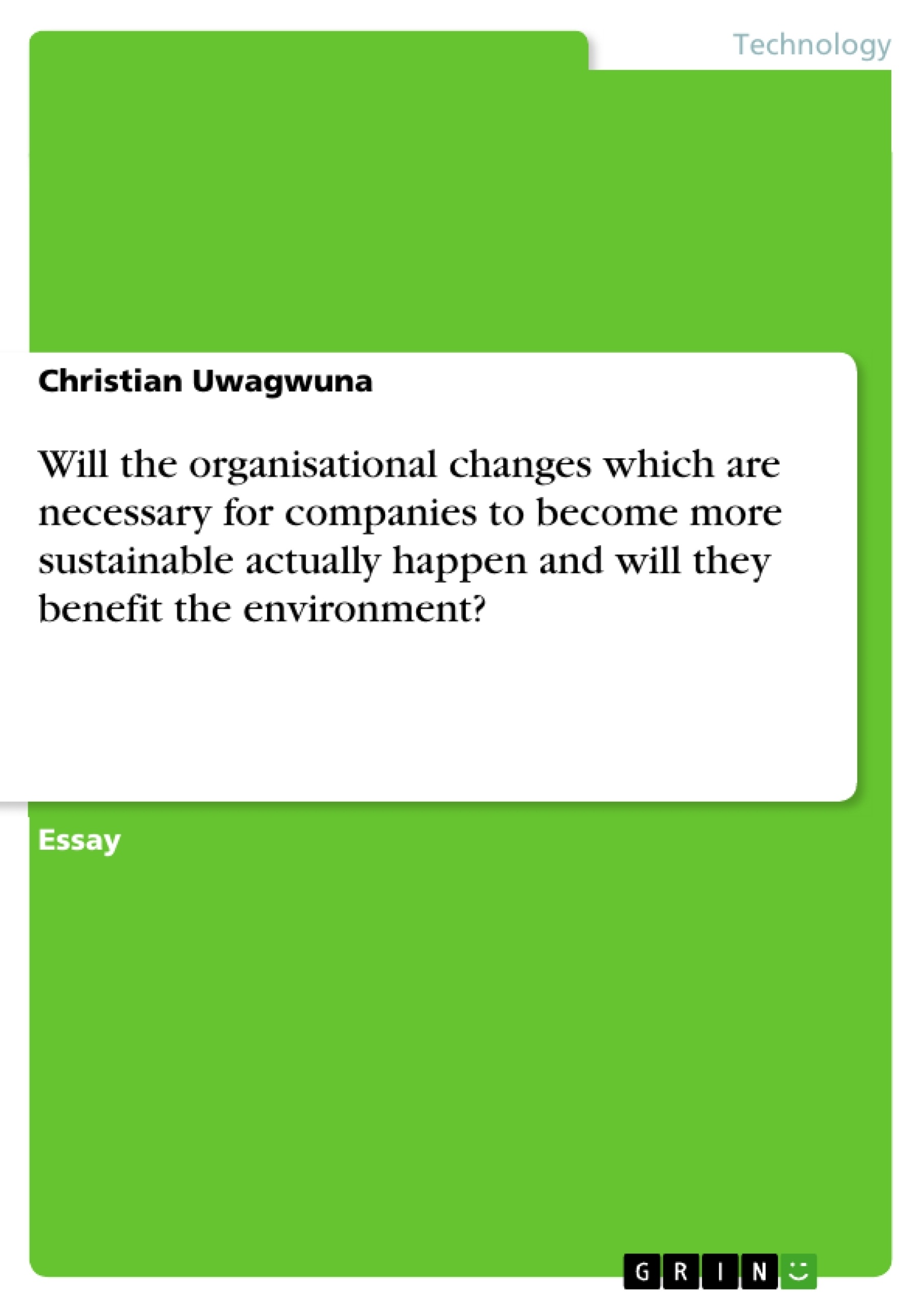Introduction
There is no gainsaying that the continuous exploitation of the world natural resources by humans and more so corporations have led to their depletion and hence resulted in environmental degradation, pollution, change in the composition of earth’s ecosystem and biodiversity, and climate change. Foremost culprit of the exploitation of the world natural resources are the various corporations who exploit these resources to develop one form of product or the other for the sole aim of making profit. Traditionally, companies are in business solely for the maximization of shareholders returns and while this business model
has been highly successful, driving businesses by shareholders value alone has become highly unsustainable (Grayson et al, 2008).
This traditional approach to business is no longer tenable in today’s modern world. This is because business practices that involve the release of huge amount of non-decomposable waste into the environment, that consume huge amount of energy, that contaminate the environment and that undermines local communities are viewed as unfriendly to the
environment and can no longer be justified solely by shareholders return. While recognizing the importance of corporate growth and profitability, corporate sustainability requires that organisation pursues societal goals, such as environmental protection, social
justice and equity (Mel, 2003).
This paper will discuss in detail what corporate sustainability entails, while corporations need to change from their traditional values to a more sustainable one, the drivers of organisational change, the condition under which the change will occur, the factors
militating against organisational change, and the various stakeholders affected by organisational change and the benefits these changes portend to the environment and 3 various species in general. Interestingly, organisational change is already underway, these
changes are driven by modern environment reality, visionary leaders within and outside the organisation and by various change agents.
[...]
Inhaltsverzeichnis (Table of Contents)
- Introduction
- Sustainable Development - what is it?
- Corporate Sustainability – Why?
Zielsetzung und Themenschwerpunkte (Objectives and Key Themes)
This essay examines the organizational changes necessary for companies to become more sustainable, considering the role of corporations in environmental issues and the need to shift from traditional business models focused on shareholder returns to a more eco-friendly approach. The paper also explores the various phases of organizational change towards sustainability, the influence of stakeholders, and the benefits for both the environment and the organizations themselves.
- The urgent need for corporate sustainability to address environmental challenges and the impact of traditional business models on resource depletion and pollution.
- The importance of adopting a holistic approach to sustainable development, encompassing economic, social, and environmental aspects.
- The role of corporations as key actors in driving sustainable development and the need for organizational change to embrace environmental responsibility.
- The analysis of various stakeholders involved in organizational change and their respective roles in promoting sustainability.
- The identification of key drivers and barriers to organizational change and their impact on the effectiveness of sustainability initiatives.
Zusammenfassung der Kapitel (Chapter Summaries)
- Introduction: This chapter provides a critical overview of the environmental crisis stemming from corporate exploitation of natural resources, emphasizing the urgency for a shift towards sustainable business practices. It highlights the inadequacy of traditional business models solely focused on shareholder returns and the need for a more responsible approach that aligns with the principles of sustainable development.
- Sustainable Development - what is it?: This section defines sustainable development according to the Brundtland Commission's definition, underscoring its multidimensional nature encompassing economic, social, and environmental considerations. It emphasizes the role of corporations as key players in driving sustainable development, highlighting the need for them to actively participate in creating a more sustainable future.
- Corporate Sustainability – Why?: This chapter explores the rationale behind corporate sustainability, recognizing the significant impact of corporations on the environment and their responsibility in addressing environmental challenges. It examines the need for a transition from traditional organizational values to those that prioritize sustainability, recognizing the evolving demands of modern society and the influence of visionary leaders in driving this shift.
Schlüsselwörter (Keywords)
The primary keywords and focus topics of this essay include corporate sustainability, sustainable development, organizational change, stakeholder engagement, environmental responsibility, resource depletion, pollution, and traditional business models.
Frequently Asked Questions
What is the main argument regarding traditional business models?
The paper argues that focusing solely on shareholder returns is unsustainable and that companies must shift toward environmental and social responsibility.
How is sustainable development defined in this essay?
It follows the Brundtland Commission's definition, encompassing economic growth, social justice, and environmental protection.
What are the main drivers of organizational change toward sustainability?
Key drivers include modern environmental realities, visionary leadership, and various internal and external change agents.
What are the potential benefits of these changes for the environment?
Changes aim to reduce pollution, prevent resource depletion, and mitigate climate change and loss of biodiversity.
Who are the stakeholders involved in this transition?
Stakeholders include shareholders, employees, local communities, and environmental organizations, all of whom influence or are affected by the change.
What factors might militate against such organizational changes?
The paper discusses barriers such as traditional corporate values, resistance to change, and the short-term focus on profitability.
- Citation du texte
- Christian Uwagwuna (Auteur), 2011, Will the organisational changes which are necessary for companies to become more sustainable actually happen and will they benefit the environment?, Munich, GRIN Verlag, https://www.grin.com/document/166241



